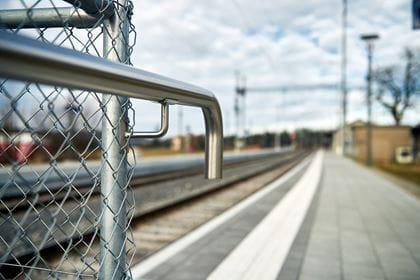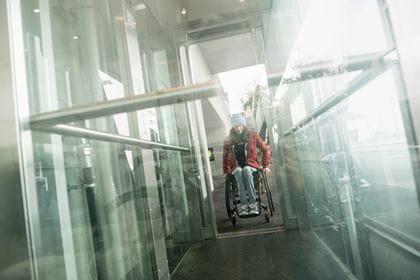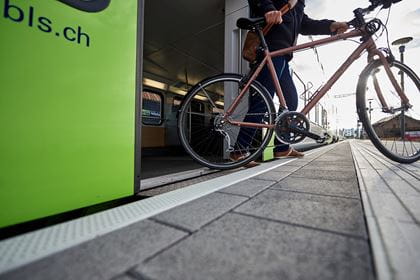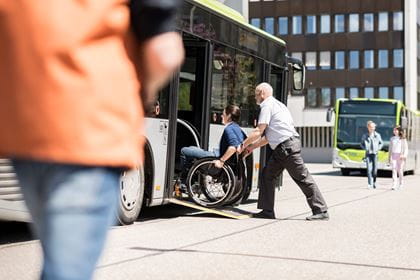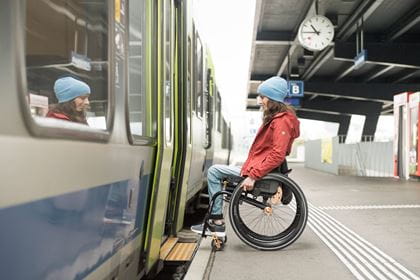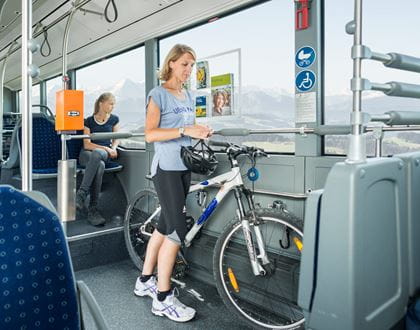Age verification
Accessible travel
It is important to BLS that everyone can use public transport independently and spontaneously. In particular, this includes people with disabilities being able to board and alight from trains independently and access all information at the train station and when on board trains.
To make this possible, BLS is adapting its train stations and all trains and buses to meet the requirements of the Disability Discrimination Act (BehiG). The Disability Discrimination Act brings improvements that benefit all passengers. For example, older people or travellers with a lot of luggage can also get around better on public transport.
Alternative solutions
- SBB Contact Center Handicap
- 0800 007 102 Gratistelefonnummer Freephone number, daily from 5.00 a.m. to midnight
Online timetable
Accessible train stations
BLS has converted 85 of its 115 train stations in accordance with the requirements of the Disability Discrimination Act (as at the end of 2023). This includes, for example, ensuring that platforms allow passengers to board trains at ground level, that ticket machines and emergency call points can be operated from a wheelchair, and that all information for travellers is provided both visually and acoustically.
In spite of the structural measures taken, some train stations are not completely accessible, because, for example they are situated on a bend and the distance between the train and platform is too great in certain places. Therefore, at the affected train stations, BLS is organising staff assistance.
BLS is resolutely pressing ahead with the realisation of accessible public transport. Of the 30 inadequate train stations, 23 will be made accessible within roughly the next ten years. BLS will not be converting seven of the train stations because the costs would be disproportionately high.
Accessible trains, buses and boats
Trains
All BLS trains fulfil the requirements of the Disability Discrimination Act (BehiG):
- Ground-level entry and exit
- Door handles with tactile identification
- All information relevant to travel is available both visually and acoustically
- Wheelchair-accessible toilets
Buses
The entire BLS bus fleet fulfils the requirements of the Disability Discrimination Act:
- Low-floor entrances with lowering mechanism
- Fold-out ramp for boarding and alighting with a wheelchair
Boats
Apart from the smallest boat, the MS Interlaken, all BLS boats on Lake Thun and Lake Brienz are wheelchair-accessible on the main deck and have a disabled toilet. On the MS Berner Oberland and the MS Thun (both on Lake Thun), the 1st class section is also accessible via a lift. Where accessibility requirements are not met, the ship's staff will assist passengers.
Accessible ticket machines
«SBB Inclusive» Customer information on your smartphone
«SBB Inclusive»: now also available on all BLS trains
The SBB Inclusive app provides visual, digital and audio customer information about stations and trains right on your smartphone. The app thereby enables people with visual or hearing impairments or impaired mobility to travel more safely and independently.
The app currently works in all Swiss railway stations, in all SBB long-distance trains, and in all BLS trains.
Travel concessions
Accompanying person's card
If you are dependent on an accompanying person when travelling by public transport, you can obtain an ID card for disabled travellers (Companion Travelcard) free of charge. With the Companion Travelcard, one accompanying person and/or one assistance or guide dog travels free of charge.
Reduced-price travelcard
Travellers with a disability and disability insurance (IV) pensioners can buy a 1st- or 2nd-class travelcard at a reduced price. This benefit is available to individuals:
- who receive a disability insurance (IV) pension
- who receive attendance allowance (Hilflosenentschädigung)
- who receive benefits for a guide dog for the blind or an assistance dog
- who are permanently dependent on a wheelchair (with medical certificate)
Reduced rates for guide dogs for the blind and assistance dogs
Guide dogs for the blind or assistance dogs in service travel free of charge in 1st and 2nd class. This benefit is available to individuals:
- who have a valid ticket
- who have an ID card for a guide dog for the blind or assistance dog
- whose guide dog or assistance dog wears a harness and is labelled with a tag on its collar
Freephone customer hotline: 0800 007 102
from 6 am to 10.30 pm
Order form for assistance
sbb.ch/en/station-services

